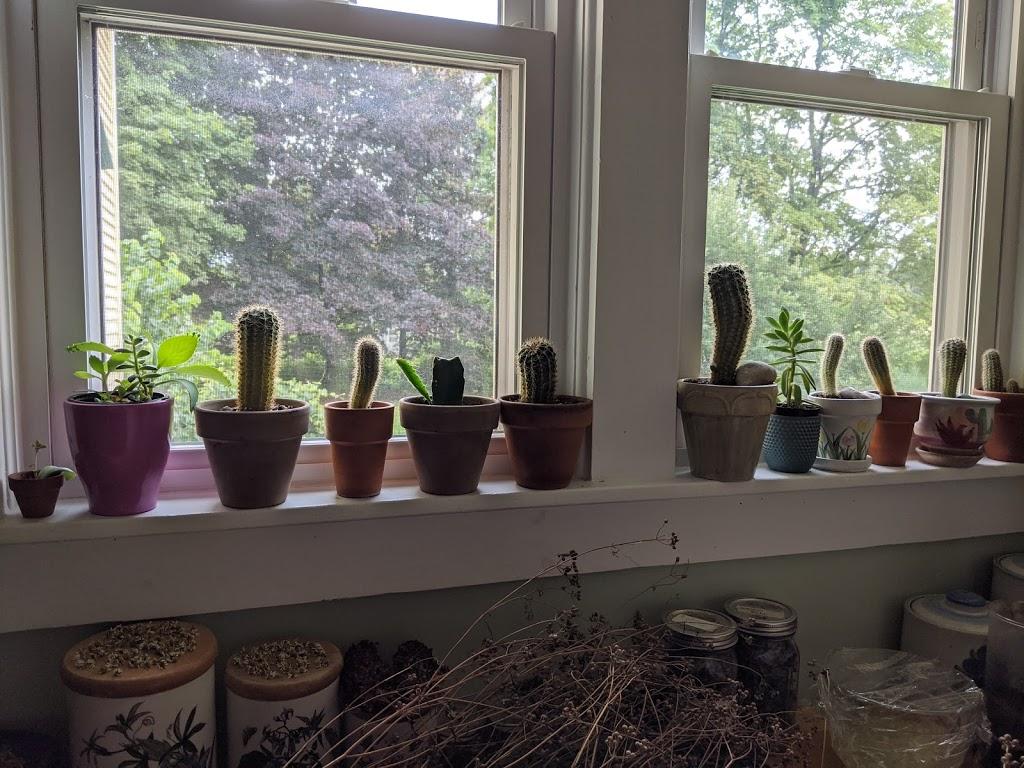Perhaps you’ve noticed the plant people. They’re a prevalent breed here in the NMU student community. You can recognize them because their windows are filled with greenery and often their plant collection has become so large that you can easily see it from outside their residence. These plant people may also knit, go thrifting, read lots of paperback books, mend their own clothes, cook delicious foods, do yoga and participate in other “old people activities.” Why? Aren’t those pastimes completely outdated in this day and age?
As one of the plant people, I will assure you that, yes, said activities are in some ways outdated. Yet all those grandma pastimes serve vital functions in navigating the complexity of life in 2020.
Whether or not an individual’s old people’s activities extend beyond growing houseplants, the spirit remains the same. When tending to the material in the world around us (watering a plant and checking for new leaves, darning a sock, turning the page of a yellowing book, determining just the right balance of spices in a meal, weeding in a garden) we nurture our bodies, slow our processing from its frenzied pace, focus our attention.
“Research has demonstrated that the presence of houseplants may be a contributor to the human ability to self-regulate their attention,” according to a study which may have found that the presence of potted plants aided children in directing their attention.
Additionally, spending time on handicrafts is a well-documented aid in healing mental health problems and emotional distress.
In our lives on the internet, our classes in EduCat and Zoom, our personalities on social media, our minds have adapted to a maze of symbols. Our surroundings have become not just our physical area but also the fractalized, electrified, threaded, the permanent environment we find in the virtual world. There seems to be a common feeling in our age group: profound disconnection simultaneous to being intensely plugged in.
Despite the many benefits of technology, and the incredible potential of the virtual information realm, sometimes that virtual world gets really complicated, or makes us sad or uncomfortable. And so the material world becomes an escape. Making things in your hands, manipulating fabric and soil, creating, mending, these are ways we can root ourselves in our bodies, in the corporeal world. Rather than quickly using things up, throwing thoughts and mass-produced things away, passing from one video clip to the next, one word to the next, one byte to the next, we find a strange return in nurturing the tangible. We find there are things in our control, in our understanding.
Often, “old people activities” have well-thought-out practical intentions behind them as well, beyond any vague philosophical reasoning. For example, gardening for food, whether in a window box, a back yard plot or a community garden, often connects to a desire to do good for the environment. Additionally, gardening for food can help ease anxieties about economic issues because it creates a small sense of food security.
Around the recession of 2007-8, it was theorized in the paper “Exploring the social bases of home gardening” that a resurgence in gardening was “a potential adaptive response to increased economic hardship.”
Both a prevalent concern for the environment and sudden economic anxiety probably contribute to the interest in gardening in the NMU community.
As for house plants, the specimens you see crowding the windows of the plant people, those don’t give us any food.
“Flora, however, are a vital and nurturing force,” according to a thesis about the impact of houseplants on home environments.
One of my close friends who claims to have caught the “green bug” from me enjoys growing house plants because of the simple joy of watching them flourish.
“They’re something I nurture to be beautiful,” she said. “And if you go into the plant people Facebook groups, everyone is nice and they just share tips and tricks. There are no negative comments or anything. If I have a question they help me, and they don’t even know me. It’s not a sport. You just get to grow beautiful things and no one is jealous of it.”
Usually, plant people collect trendy succulent specimens, and my friend and I are no exceptions. Our windows are filled with jades, aloes, gasteria, cacti, pilea and hoya. Kooky as it is to say, succulents have a particular lesson on resilience to teach young people. Cut a leaf or stem from a succulent plant, and the detached scion will begin to grow into its own individual being. Using the resources contained within the severed leaf or small branch, the plant begins its new birth by sending out roots. With that accomplished, it proceeds to create tiny new leaves with which to support its maturation. When a succulent plant becomes afflicted with certain maladies such as root rot, it is often best to sever the leaves and branches, and let the healthy foliage reinvent itself as new plantlets.
Given the feeling of disconnection our age group seems to experience, and the difficult life events all people have to endure, it seems like we all need to learn how to use our internal energy, to grow roots in the material world and send out leaves.
























